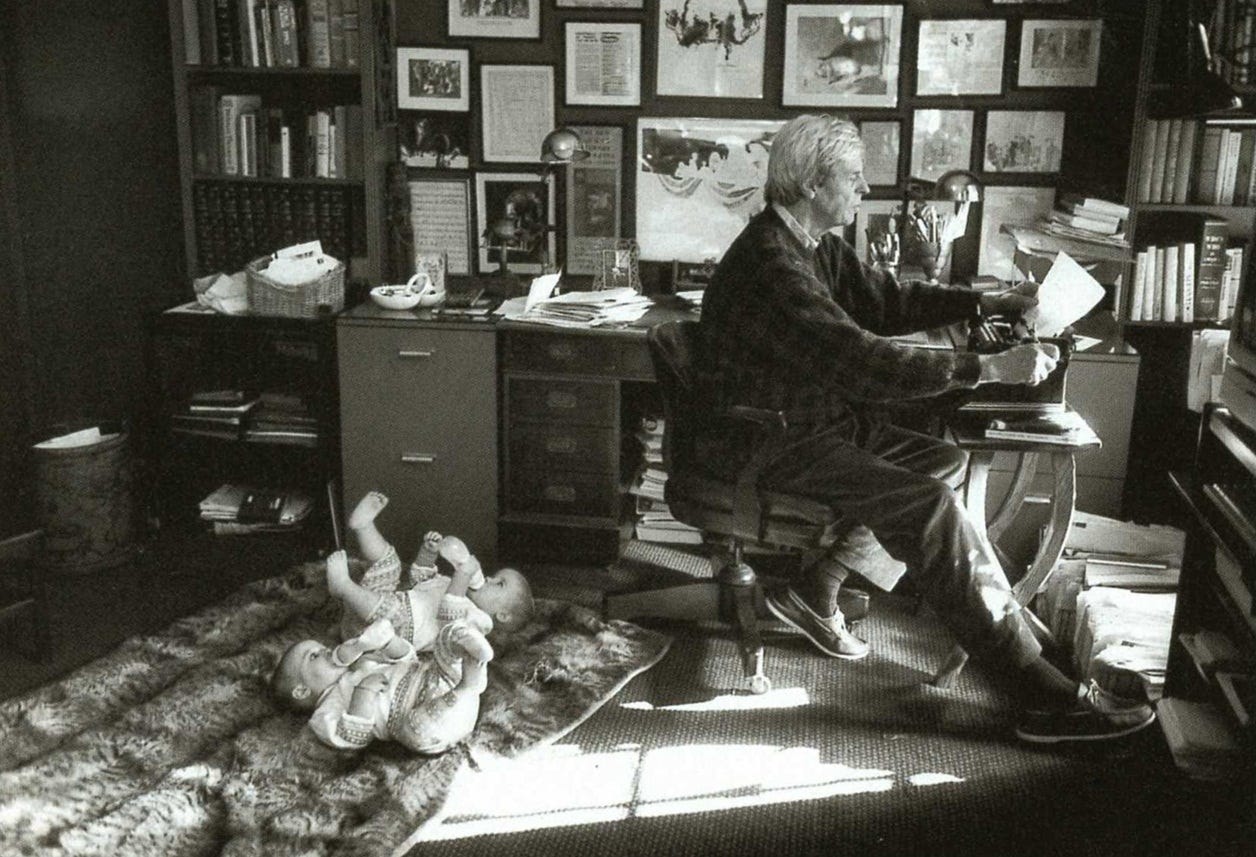Plague Journal, Vol. 5

Photo: George Plimpton, prolific writer and journalist, co-founder of the Paris Review, occasional actor and comedian, ignoring his kids to get work done before it was cool.
Everything is back to normal. Or else it’s worse than ever. Hard to tell. Someone on Twitter wrote that living in Canada, right now, is like living in an apartment above a meth lab. It’s a good simile, but I’d add a small (but meaningful) detail: it’s a meth lab full of guns.
Here are some of the most interesting things I’ve read/looked at since we last spoke.
/////
1 — Ross Douhat’s Ten Theses About Cancel Culture in The New York Times
“Cancel culture is destroying liberalism. No, cancel culture doesn’t exist. Actually, it does exist—well, look, I can’t explain it to you until you’ve read at least four open letters on the subject.”
/////
2 – The infamous Letter on Justice and Open Debate in Harper’s, signed by all the people everyone now hates.
“The free exchange of information and ideas, the lifeblood of a liberal society, is daily becoming more constricted. While we have come to expect this on the radical right, censoriousness is also spreading more widely in our culture: an intolerance of opposing views, a vogue for public shaming and ostracism, and the tendency to dissolve complex policy issues in a blinding moral certainty. We uphold the value of robust and even caustic counter-speech from all quarters. But it is now all too common to hear calls for swift and severe retribution in response to perceived transgressions of speech and thought.”
/////
3 — Stephen Marche’s The Passport in The Literary Review of Canada
“The passport gave me the sensation of homecoming, familiarity, the knowledge of my physical safety, an assumption of care that has become less and less easy to take for granted in a sickening world. To have a passport, to have papers is a blessing we could ignore before COVID-19 but not after. I would be lying if I did not acknowledge a positive presence, too, a connection with a people. I was grateful to be among Canadians.”
/////
4 — Denis Shiryaev’s remarkable Restored Footage of Tokyo in 1913-1915

/////
5 — Robert Jago’s Terra Incgonita Editor’s Letter in The Walrus
“My grand ambition is not to write angry letters about Rex Murphy or to be the token minority asked to rebut Stockwell Day; that’s no one’s life goal. But it’s something I’ve been asked to do in the past. People saw this as a fit use of my time. If none of this stuff was happening to us, and if I could wake up tomorrow as a different person, it wouldn’t be as Sitting Bull or Malcolm X—it would be as Anthony Bourdain. That’s a life I would sell my soul for: to live without a big fight, to drink and eat and travel, and to show people the world’s cultures through food.”
/////
6 — Angela Watercutter on Doomscrolling in Wired
“Doomscrolling will never actually stop the doom itself. Feeling informed can be a salve, but being overwhelmed by tragedy serves no purpose. The current year is nothing if not a marathon; trying to sprint to the end of one’s feed will only cause burnout and a decline in mental health among the people whose level-headedness is needed most. That means you, dear reader.”
/////
7 — Eric Ravenscraft on how Our Ability to Process Information Is Reaching a Critical Limit in OneZero
“A growing body of research highlights the strain on our ability to read, understand, process, and take action on the flood of news with which we’re confronted. Some of the biggest events in 2020 have demanded more of our time, more direct action, and have been more emotionally taxing than we’re used to. The result feels like a mental DDoS attack that drags down our mental health, allows misinformation to thrive, and even makes the job of delivering news more difficult.”
/////
8 — Stephen Marche (again) on Using an Algorithm To Help Him Write a Story in the MIT Technology Review.
“Our goal in that first experiment was modest: to see if algorithms could be an aid to creativity. Would the process make stories that were just generically consistent? Could an algorithm generate its own distinct style or narrative ideas? Would the resulting story be recognizable as science fiction at all? The answer to all these questions was yes.”
/////
9 — L.M. Sacasas on Children and Technology in The Convivial Society
“In my experience, parents are almost always looking for concrete and practical advice to follow, which is the kind I’m least likely to offer. Not because I like to be factitious, but because I think it’s important to recognize how questions about how much screen time is too much, for example, actually hint at a more subtle consequence of the technological framing of the task of raising children. In other words, while we focus on specific devices in our children’s lives, we sometimes miss the technocratic spirit we are tempted to bring to the task of raising children.”
/////

10 – Normal People on CBC Gem
TV shows, unlike movies, require a significant commitment of time, and one’s enjoyment of them is often less tied to plot or spectacle than to the question of how much time you’re willing to spend with these particular characters in this particular world. In the case of Normal People, the answer is: all the time. It’s a strange show to recommend, because it feels so inexplicably, inscrutably personal to me. It’s moody and meandering. There’s lots of sex, but also lots of silence. The characters will frustrate you. But, if you’re like me, you might experience that uncanny sensation great art provokes: to feel less like you’re watching a story unfold and more like you’re living another life. It’s not just the best TV show of the year—it’s also the best new Instagram account of the year.
/////
Enjoy the summer. It’ll be over soon, and you’ll miss it.




